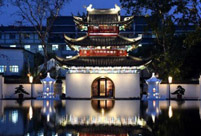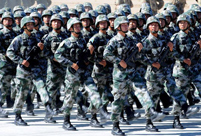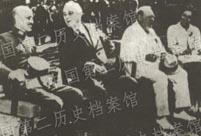 YOG kicks off in Nanjing
YOG kicks off in Nanjing
 Colorful life at Youth Olympic Village of Nanjing 2014 YOG
Colorful life at Youth Olympic Village of Nanjing 2014 YOG
 Royal Taoist temple to open to public
Royal Taoist temple to open to public
 Female soldiers at quake-hit area
Female soldiers at quake-hit area
 Shocking photos of cruel battles in Ukraine
Shocking photos of cruel battles in Ukraine
 Amphibious armored vehicle unit conducts open sea drill
Amphibious armored vehicle unit conducts open sea drill
 Water relay in Henan
Water relay in Henan
 Ethnic culture feasts eyes of travelers
Ethnic culture feasts eyes of travelers
 80 security dogs assembled in Nanjing police dog training base
80 security dogs assembled in Nanjing police dog training base
 Graffiti artists paint on street walls in Xinjiang
Graffiti artists paint on street walls in Xinjiang
TOKYO, Aug. 25 -- The Japanese government on Monday said it would make available in September first-hand testimony from the late Masao Yoshida, chief of the Fukushima Daiichi nuclear power plant when it underwent multiple meltdowns after being struck by an earthquake-triggered tsunami in March 2011.
The testimony of the former Fukushima Daiichi nuclear power plant chief Yoshida, who died aged 58 from esophageal cancer in July 2013, was given in a series of interviews comprising around 20 hours to a government panel between July and November 2011 and has remained sealed to third parties at Yoshida's request.
The former plant chief had previously said he wanted his evidence to remain classified for fear that the details of the worst nuclear disaster since the Chernobyl crisis in 1986, might be misinterpreted or misunderstood by the media and the public.
But under increased pressure from victims of the nuclear disaster at the now stricken facility located northeast of Tokyo, some of whom have filed lawsuits to force the government to release the evidence, and as local newspapers have begun publishing excerpts of Yoshida's accounts of the events that transpired in the hours, days and weeks following the quake and tsunami knocking out the plant's key cooling systems, the government has decided not to honor Yoshida's request for confidentiality.
"Former plant chief Yoshida did not want his testimony to be made public as he had mentioned concerns about misinterpretation, but the situation has changed," Chief Cabinet Secretary Yoshihide Suga told a press conference earlier Monday.
"In addition to the Yoshida testimony, the content of interviews with others who had key roles in handling the disaster will be released at the earliest possible date in September, starting with whichever is ready first," Japan's top government spokesperson said.
Suga warned, however, that the government would not release any information from the testimonies pertaining to national security or privacy.
Public interest in the testimony of Yoshida and others in positions of power at the plant when it underwent multiple meltdowns has been consistently rising since stories have transpired in local newspapers revealing Tokyo Electric Power Company's (TEPCO) ineptitude at the time of the crisis and the government's subsequent mishandling of the disaster.
Such stories reported in local newspapers include those stating that 90 percent of the plant's workers fled the site immediately after the tsunami hit for their own safety, despite being ordered by Yoshida to stay.
The safety inspectors that were among those that fled the site, despite Yoshida's orders, were under the Nuclear Industrial Safety Agency (NISA), duty-bound to remain on-site to provide factual and ongoing assessments of the situation so the utility and the government could formulate a clear action plan for the safety of the immediate area, surrounding prefecture and, ultimately, the world.
As it happened, due to the NISA not being available at the plant, the government was forced to rely on TEPCO's own shoddy and muddled information, that exacerbated the level of the disaster by providing the government and the public with slow news, data and reports and, oftentimes, complete misinformation.
Other stories reported in newspapers have quoted TEPCO employees as saying that staff at the plant attempted to jump start an emergency cooling system using car batteries and small diesel generators after the battered nuclear station's vital back up systems failed, ultimately leading to the triple meltdown at the plant, in evidence of the sheer desperation and loss of control that staff at the plant were experiencing at the time.
As data from Fukushima Medical University revealed Monday that seven new cases of thyroid cancer among people who were aged 18 or under when the disaster broke out in March 2011 have been detected since May, bringing the total number of thyroid cancer cases among prefectural residents in this age group to 57, it remains to be seen to what extent the government will release the more than 770 testimonies it is holding sealed, taken from key figures interviewed during the disaster, that could reveal how future catastrophes of this nature could be avoided or better dealt with.
 Special holidays
Special holidays World's top 10 fighters
World's top 10 fighters 'Stewardesses' serve in hospital
'Stewardesses' serve in hospital Beautiful night scenery of Nanjing
Beautiful night scenery of Nanjing ‘Peace Mission -2014’ joint anti-terror military exercise kicks off in China
‘Peace Mission -2014’ joint anti-terror military exercise kicks off in China Eye-catching guides at the opening ceremony of YOG in Nanjing
Eye-catching guides at the opening ceremony of YOG in Nanjing A female missile launch company of PLA
A female missile launch company of PLA China, the U.S., Britain and the Soviet Union call for Japan's unconditional surrender
China, the U.S., Britain and the Soviet Union call for Japan's unconditional surrender Photo story: How a baby panda grows up
Photo story: How a baby panda grows up Star-leveled nursing home in a small county
Star-leveled nursing home in a small county Evidence of monstrous crime of Japanese invaders
Evidence of monstrous crime of Japanese invaders Foreign models compete with Chinese in Cheongsam show
Foreign models compete with Chinese in Cheongsam show The beautiful pictures of ancient Chinese architecture
The beautiful pictures of ancient Chinese architecture The Muslims involved in relief work
The Muslims involved in relief workDay|Week|Month